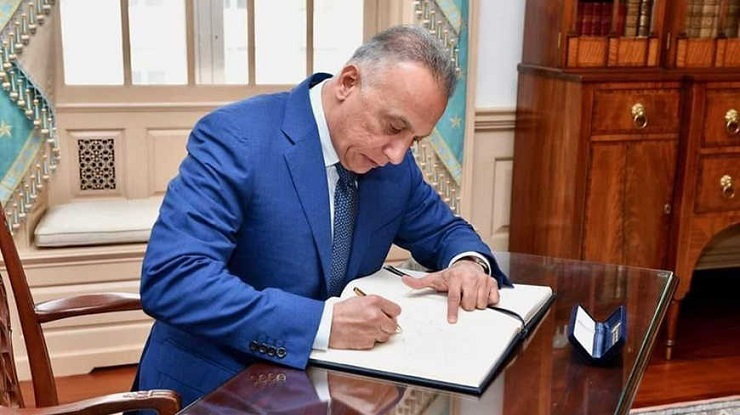Ever since the US invasion, Iraq’s political system has been anything but stable. For a country like Iran, which eyes the US-occupied Iraq as a US proxy ground, the imperative of preventing the use of Iraqi territory against itself holds premier significance. Therefore, Iranian imperative and the nature of its interests demand a kind of presence in Iraq that is not only not completely dependent on the leader of the country or the office of the prime minister, which is anyway unstable, but goes beyond it as well, allowing it to protect and materialise its interests. It is for this reason that Iran, unlike the US, has never been keen to install a proxy prime minister. On the contrary, its resistance ideology has been more focused on establishing fighting units which are not only deeply embedded in the society, but also allow Iran to flex its muscle rather freely and independently of the political leadership. This explains why Iran, despite having other preferred candidates on its list, still chose to back other candidates for prime ministership in 2006 and 2014 and in 2020.
In this context, the ‘instalment’ of Kadhimi as Iraq’s prime minister is far from a blow to Iran’s influence in Iraq. Neither is it an expression of “negative thinking” in Iraq against Iran, nor an expression of Iran’s loss of control over parties and blocs allied with it.
Although Kadhimi has a history of direct relations with the US and Saudia and continues to receive political, security, intelligence, and logistical support from his friends, his appointment is only an interim arrangement between Iraq’s warring political factions, although the US does want to make use of him to push back Iran’s influence, including Iran backed militias. Indeed, Kadhimi has taken some steps that seem to go in this direction. On June 26, he ordered a raid on the headquarters of one of the prominent Iran-backed militia factions south of Baghdad — Kata’ib Hezbollah, whom US officials have accused of firing rockets at bases hosting US troops. Arrested members of the militia were, however, quickly released.
However, notwithstanding these actions, Kadhimi is as weak a prime minister as the previous ones. The fact that Iran, despite having the power in the parliament to block his appointment, did not chose to do so speaks volumes about how it engages with Iraq and that it can always use this influence to bring a vote of no confidence against Kadhimi. The fact that Kadhimi is seen as a ‘pro-US’ is a weakness in the Iraqi context that can always trigger opposition into a movement. Iran, for now, is cultivating relations with Kadhimi to maintain friendly ties.
Kadhimi’s recent visit to Iran further clarified the kind of relation Iran is looking to have with him and what particular interests it wants to secure in Iraq. Sensing this, Kadhimi was quick to comment that “Iraq would not allow any threat to Iran coming from its territory.” Iran’s Supreme Leader Ali Khamenei was rather explicit when he told Kadhimi that the Popular Mobilisation Units (which Iran supports) are a “great blessing for Iraq, and they should be safeguarded.”
While Kadhimi may not have enough power to prevent the use of Iraqi territory against Iraq—he is already partly blamed by some Iraqi political groups for the killing of Soleimani—he is equally powerless vis-à-vis Iran aligned parties and parliamentary groups who perceive him as ‘pro-US’, and consider the previous ‘pro-US’ regimes responsible for Iraq’s political instability.
Therefore, even if the US wants to use Kadhimi as a ‘strongman’ to push back Iran’s influence and tackle Iranian militias, Iraq’s ground realities currently show no seeds powerful enough to produce a fundamental anti-Iran shift.
Therefore, even though Kadhimi mentioned his objective of reforming the Iran-backed popular mobilization units, PMU’s influence in Iran’s politics and parliament is deep enough to deny any US-sponsored reform agenda. The extent of Iranian influence can be gauged from the fact that when On January 5, Iraq’s parliament voted 170 to 0 to expel US forces, all of Iran’s Shiite allies in parliament voted for the non-binding resolution. Sunni and Kurd votes were either absent or did not vote.
Kadhimi is, therefore, not a “bad news” for Iran. Going by Iranian perspective, Mustafa al-Kadhimi, on the contrary, still presents an opportunity for Iran more so than a threat. Powers in the Iranian state believe that with Kadhimi’s background as an intelligence officer, he would be well-experienced in the game of balance of power. Given that the US still has a direct presence in Iraq, maintaining balance between Iran and the US is an inevitable task that every Iraqi prime minister has been facing and will continue to face in the future as well.
While Kadhimi may still not be an ideal candidate for Iran, recent demonstrations in Iraq seem to have convinced Iranian leadership as well that installing a proxy in Iraq could be counterproductive for Iran’s long-term interests in Iraq and its deep presence in Iraq’s political and security structures.
Salman Rafi Sheikh, research-analyst of International Relations and Pakistan’s foreign and domestic affairs, exclusively for the online magazine “New Eastern Outlook”

